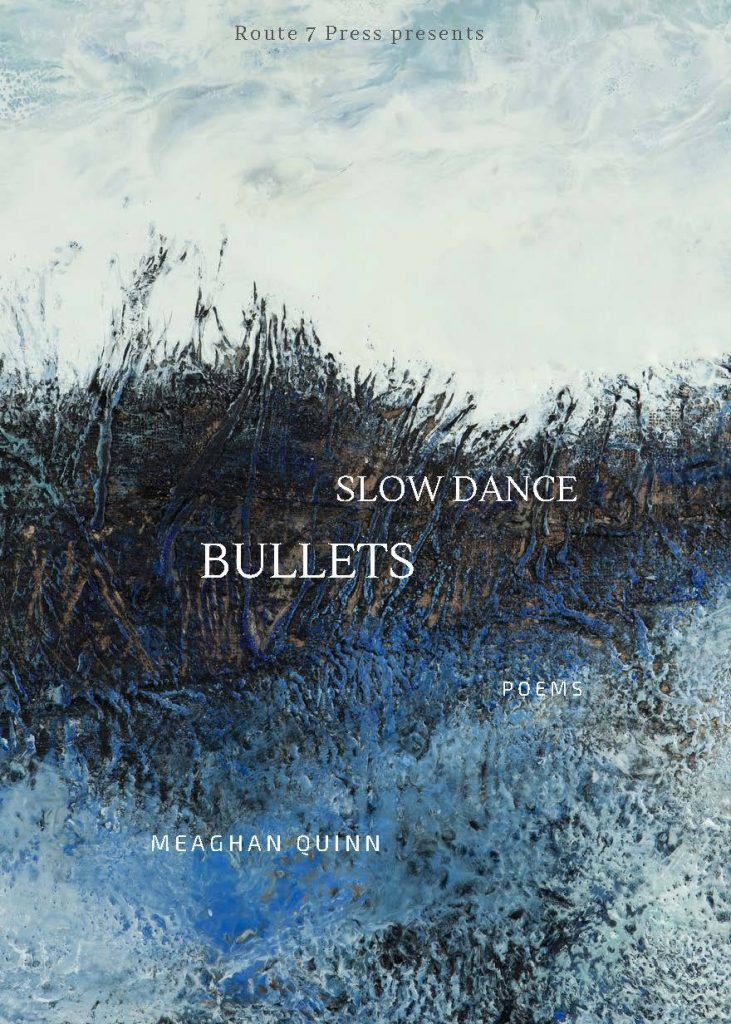
(Route 7 Press, 2019)
REVIEW BY GAIL DIMAGGIO
—
Meaghan Quinn’s first book Slow Dance, Bullets opens with Withdrawal and closes with How to Forgive Yourself. Between those poles, the poems re-enact a pain-filled journey in language both contemporary and timeless, commercial and sacred. The speaker fasts on Snapple and Mentos, her brothers dip hands into “urinals of holy water”, spring pushes green leaves “up through horse shit” and death won’t hurt as much if we just keep moving. Throughout, Quinn’s voice is as lyrical as a spinning tire swing, as sensuous as a razor blade.
While the journey includes addiction and recovery, it is not defined so much by that contemporary tale as a more primal story: a girl tossed out of paradise, naked and nameless trying to remake the world and herself out of nothing. A sense of sin, it turns out, provides the rocky foundation for identity. In this world, the speaker is one of the “lost kids” who become “something and nothing up there on the cliff/perched over water.”
The poem “A Childhood” combines the sanctified language of Catholicism with the ritualized motion of the pantoum into an eerie sense of constant motion never advancing. Between the first and last stanza, the speaker loses her identity as the obedient girl who took Communion and blessed her dolls and is transformed into a stranger who wraps those dolls in plastic and blames God for the rain. “The babysitter hurt me,” she tells us and then “the babysitter hurt the girl in the white ranch,” and by the time the “baby sitter left, no one knew me.”
For a long time, the speaker searches for someone to lead her home, to lead her back to the “blow up pool.” The few adults turn out to be distracted or beside the point—her beloved mother picking up “cig buts flicked by the sad uncles.” A professor knocking back Tequila shots and conjugating, “the verb to be/ like I knew what it meant to be sum, es, est.” For the rest, she learns what it means “to be” from other ‘lost kids’: “sitting cross-legged…./Rubinoff bottles balanced between our thighs.” And “older girls (who) pushed us out of cars/pretended to brand our feet.” And her brothers: Cain and Abel she calls them, adored and energized and in love with danger.
Cain
even now grinning
under the clothesline
waiting to be oiled like
the smooth grooves of a gun
waiting to be triggered.
Increasingly, she searches for transformation in some sexual blood sacrifice as in Construction Sites, where she “wanted them to notice me/ to pin me down/ to beast me into/something I wasn’t//& so I stepped on a nail,” let a boy “carry me like a slain sheep.” She seems to be trying to see if she can make a life and a self out of the religion of sexuality and a sense of sin.
& wasn’t this my entryway into identity
my right to know how wrong this all was because
we were running the risk of getting caught….
& how even now I’m dreaming of hearing
a tattered mouth suck on a thigh of salvation….
One after one, she turns to her lovers, most of them as lost and suffering as she is: girl in the parking lot/behind McCaffery’s Pub, the girl from the Irish Bar, the soldier in “Camp Le Jeaune” “eyes like a shard of shrapnel.” Each human contact wrapped in pain and promising pain, no available escape but “Escapism.” The journey heads down into the drowning waters of addiction. In “I Don’t Remember Making My Confirmation,” the speaker tells us that she now “feels God in my chest/when I stand sauced//buzzing before the altar”.
Quinn’s poems make it clear that the chance of survival is as random as the chance of addiction. That not everyone finds a companion who sat all night beside the speaker, whose “unholy face [is smashed] against the tiles.” A companion with the wisdom not to ask why she “takes the same thing/they use at zoos to put elephants to sleep.” Another who will paddle out to sea “just as the sky turns neon” and is willing to let her be the one to say whether they stay or turn back.
Of course, in the end, salvation—spiritual or mundane—remains mysterious. These poems are too wise and too honest to pretend we can know what makes it possible for a “lost kid” to accept life, “to learn the hard way that there is nothing/poetic about death.” To decide “to be.”
—
Gail DiMaggio is the author of Woman Prime, selected by Jericho Brown for the 2018 Permafrost Poetry Prize published by Alaska University Press. Her work has appeared most recently in Salamander, Slipstream, The Tishman Review, and elsewhere. She lives and writes in Concord, NH.
![[PANK]](https://pankmagazine.com/wp-content/themes/pank/assets/images/pank-logo-large.png)
